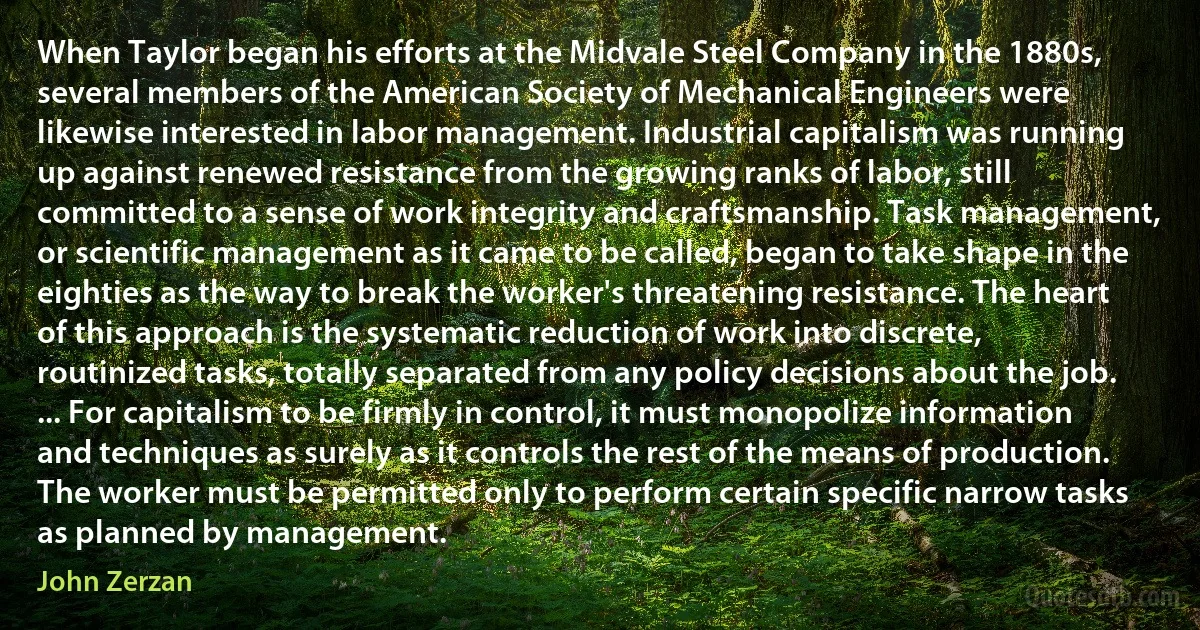
When Taylor began his efforts at the Midvale Steel Company in the 1880s, several members of the American Society of Mechanical Engineers were likewise interested in labor management. Industrial capitalism was running up against renewed resistance from the growing ranks of labor, still committed to a sense of work integrity and craftsmanship. Task management, or scientific management as it came to be called, began to take shape in the eighties as the way to break the worker's threatening resistance. The heart of this approach is the systematic reduction of work into discrete, routinized tasks, totally separated from any policy decisions about the job. ... For capitalism to be firmly in control, it must monopolize information and techniques as surely as it controls the rest of the means of production. The worker must be permitted only to perform certain specific narrow tasks as planned by management.
John ZerzanRelated topics
approach begin break came certain commit company control craftsmanship growing heart industrial job labor likewise narrow plan production reduction rest running sense specific steel take task way work means eighties taylorRelated quotes
As in the case of the individual, not all the information which is available to the race at one time is accessible without special effort. There is a well-known tendency of libraries to become clogged by their own volume; of the sciences to develop such a degree of specialization that the expert is often illiterate outside his own minute specialty. Dr. Vannevar Bush has suggested the use of mechanical aids for the searching through vast bodies of material. These probably have their uses, but they are limited by the impossibility of classifying a book under an unfamiliar heading unless some particular person has already recognized the relevance of that heading for that particular book. In the case where two subjects have the same technique and intellectual content but belong to widely separated fields, this still requires some individual with an almost Leibnizian catholicity of interest.

Norbert Wiener
The fact is that the choice between Socialism-from-Above and Socialism-from-Below is, for the intellectual, basically a moral choice, whereas for the working masses who have no social alternative it is a matter of necessity. The intellectual may have the option of "joining the Establishment" where the worker does not; the same option holds also for labor leaders, who, as they rise out of their class, likewise confront a choice that did not exist before. The pressure of conformity to the mores of the ruling class, the pressure for bourgeoisification, is stronger in proportion as personal and organizational ties with the ranks below become weak. It is not hard for an intellectual or bureaucratized official to convince himself that permeation of and adaptation to the existing power is the smart way to do it, when (as it happens) it also permits sharing in the perquisites of influence and affluence.

Hal Draper
There are also animals which are called elks [alces "moose" in Am. Engl.; elk "wapiti"]. The shape of these, and the varied colour of their skins, is much like roes, but in size they surpass them a little and are destitute of horns, and have legs without joints and ligatures; nor do they lie down for the purpose of rest, nor, if they have been thrown down by any accident, can they raise or lift themselves up. Trees serve as beds to them; they lean themselves against them, and thus reclining only slightly, they take their rest; when the huntsmen have discovered from the footsteps of these animals whither they are accustomed to betake themselves, they either undermine all the trees at the roots, or cut into them so far that the upper part of the trees may appear to be left standing. When they have leant upon them, according to their habit, they knock down by their weight the unsupported trees, and fall down themselves along with them.

Julius Caesar
There's a human race, and different skin colors, and different racial, what we call racial characteristics. There's several theories about where those come in. Probably the best theory is that the Tower of Babel, which would have been a few hundred years after the flood, is where the races began. When god confused the languages, they went off into their small groups, all speakin' the same language. And if you get a small in-breeding group, you know, 2000 years after the creation, you're gonna get genetic disorders, and racial traits could be a result of this Tower of Babel incident. But I think that there's no question from scripture and from science that all humans are the same race, and have the same genetic code, and certainly can interbreed. So there's no reason scripturally to be a racist. You know, we all came from Adam and Eve, and then later from Noah and his family.

Kent Hovind
The socio-technical concept arose in conjunction with the first of several field projects undertaken by the Tavistock Institute in the coal-mining industry in Britain. The time (1949) was that of the postwar reconstruction of industry in relation to which the Institute had two action research projects.(2) One project was concerned with group relations in depth at all levels (including the management/labor interface) in a single organization - an engineering company in the private sector. The other project focused on the diffusion of innovative work practices and organizational arrangements that did not require major capital expenditure but which gave promise of raising productivity. The former project represented the first comprehensive application in an industrial setting of the socio-clinical ideas concerning groups being developed at the Tavistock.

Eric Trist
